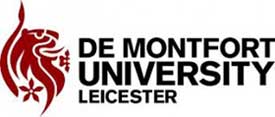About Interior Design BA (hons) in De Montfort University
Interior Design challenges us to rethink existing interiors as well as looking at the spaces created between structures. It focuses on the way people interact within these environments.
On this course you’ll explore the regeneration and adaptation of real buildings and sites and learn how to turn old commercial premises into exciting new spaces for exhibition, retail, leisure, eating and socialising purposes. You’ll develop skills in drawing, 3D modelling, computing, video-modelscope and computer-aided design (CAD).
You’ll also learn about the importance of visual communication, design cultures and heritage, and culture and context. This solid foundation will enable you to develop your own personal style and design language and, as you grow in confidence, you’ll become increasingly autonomous as you pursue individual design projects.
Key features
- Considerably boost your career prospects with an industry placement. Our students have gained valuable industry work experience at companies such as Ashfield Events, Newman Gauge, Tibbatts Abel and PVH Europe.
- Gain industry exposure by entering prestigious competitions which have earned students prizes from the British Institute of Interior Design, the Interior Design Association and the Royal Society for the encouragement of Arts, Manufactures and Commerce.
- 100% of our Interior Design graduates from summer 2017 are in work or further study after graduating (Destinations of Leavers from Higher Education (DLHE) 2016-17 report).
- Learn to design for different spaces – leisure, retail, performance, living, spiritual and exhibition – and communicate your creative solutions with confidence.
- Benefit from the very latest facilities – CAD, modelscope, drawing studios, video visualisation equipment and prototype workshops. Our award-winning Vijay Pazzzztel Building provides both the space and the facilities to foster creative thinking and explore your design potential.
- Gain valuable international experience as part of your studies with our DMU Global programme, which has taken students from Hamburg to New York to explore the history and evolution of interior design.
- Our graduates have gone on to work for a range of large, medium and small design practices including Blueprint, SomeBrightSpark, Fitch Design, Faber, Checkland Kindleysides and Leonard Design Architects.
- We provide core workshop materials at no cost, and give cash awards – £150, £200 and £300 in years one, two and three respectively – to support personal materials/printing costs.*
Typical entry requirements
A good portfolio and normally:
- Art and Design Foundation or
- 112 points from at least 2 A-levels and including grade C in Art and Design or
- BTEC Extended Diploma DMM in an Art and Design related subject or
- International Baccalaureate: 26+ Points including Art and Design
Plus five GCSEs grades 9-4 including English Language or Literature at grade 4 or above.
- Pass Access with 30 Level 3 credits at Merit in Art and Design and GCSE English (Language or Literature) at grade 4 or above
We will normally require students to have had a break from full time education before undertaking the Access course.
- We also accept the BTEC First Diploma plus two GCSEs including English Language or Literature at grade 4 or above
International students
If English is not your first language an IELTS score of 6.0 overall with 5.5 in each band, or equivalent when you start the course is essential. English Language tuition, delivered by our British Council accredited Centre for English Language Learning, is available both before and throughout the course if you need it.
De Montfort University Highlights
| Type of Institution |
Public |
| Campus Setting |
Urban |
| Endowment |
£1.17 million |
| Number of Campuses |
4 faculties |
| Number/Percentage of International Students |
23205 |
| Total number of Professors |
3240 |
| Student Satisfaction Rate |
86% |
| Graduate Job Rate |
97.3% |
| Number of Residence Vacancy |
Around 3000 |
| International fee |
Undergraduates- £13240 (annual) Postgraduates- £15950 (annual) |
| Number of Academic Programs |
UG, PG, Part time, distance, blended |
| Mode of Program |
Full time, distance and online |
| Average Graduate Salary |
19800 pounds a year |
De Montfort University The tuition fee (In GBP) for various programs is tabulated below:De Montfort University Average Cost
| Field of Study |
Avg.Fees |
| Art, Design and Humanities: |
£13,750 |
| Business and Law |
£13,750-£14,550 |
| Media |
£13,750 - £14,250 |
| Engineering |
£14,250 |
| Computing |
£14,250 |
| Health and Life Sciences |
£13,250 - £14,250 |
| Nursing BSc |
£14,950 |
De Montfort University The Average Tuition Fees and Other Expenses
| Expenses |
Estimated cost in pounds |
| Undergraduate tuition fee |
13,250- 14950 |
| Postgraduate tuition fee |
13600-15,900 |
| On campus accommodation |
5,000-6040 |
| Average cost of living |
97-110 per week |
DMU International Scholarship up to 1500 pounds
- TEF Gold Outstanding Alumni Scholarship up to 3000 pounds
- Leicester Castle Business School Scholarships:
- Global MBA Scholarship £3,000 - £5,000
- Full Postgraduate Scholarship
- LGBTQ + Allies Scholarship-two fully funded post graduate taught scholarship packages including full fee weaver and maintenance bursary.
- Vice Chancellor's Sports Scholarship- three different scholarship packages are available with eligible students being awarded up to 6000 pounds of support.
